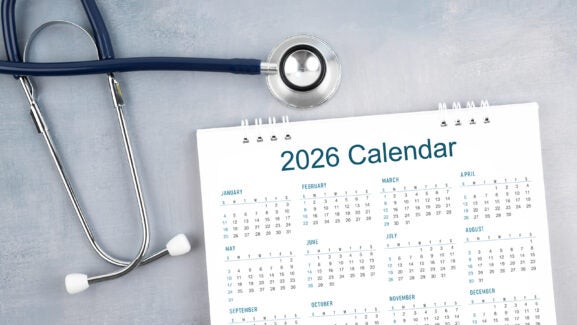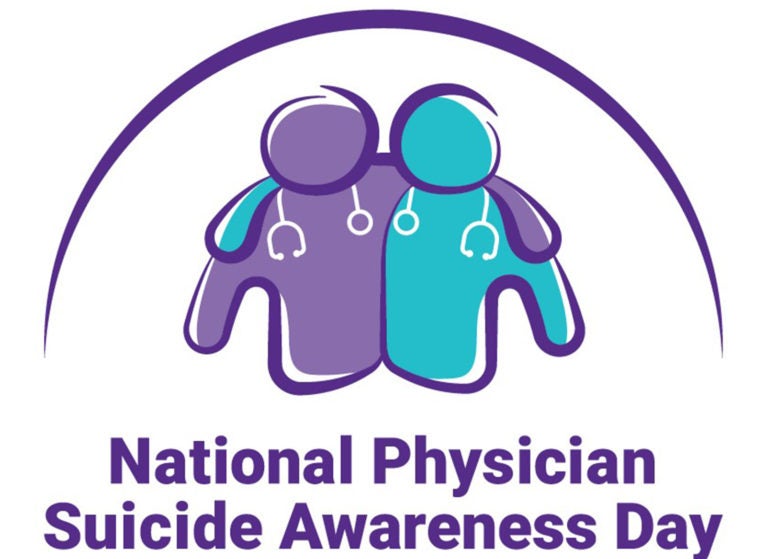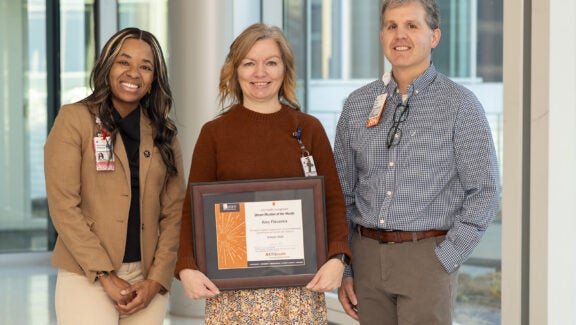

Sept. 17 Is National Physician Suicide Awareness Day | Resources to Help Yourself and Colleagues
National Physician Suicide Awareness Day is a day dedicated to honoring the memory of colleagues who have died by suicide. This day also gives us the opportunity to raise awareness about physician suicide and encourage discussion of how we can prevent it. Suicide is preventable if we:
- Take the time to notice a stress injury in our colleagues,
- Take the steps to care for each other,
- Destigmatize mental health issues and conversation about this topic, and
- Break the silence and offer peer support. If you notice signs of stress in a colleague, step in, reach out.
In order to address the issue of physician suicide, the Council of Residency Directors in Emergency Medicine (CORD), in collaboration with American Academy of Emergency Medicine (AAEM), American College of Emergency Physicians (ACEP), American College of Osteopathic Emergency Physicians (ACOEP), Emergency Medicine Residents' Association (EMRA), Resident Service Associates (RSA), Resident Student Organization (RSO), and Society of Academic Emergency Medicine (SAEM) have come together to annually dedicate Sept. 17 as National Physician Suicide Awareness (NPSA) Day.
According to CORD, "While estimates of the actual number of physician suicides vary, literature has shown that the relative risk for suicide being 2.27 times greater among women and 1.41 times higher among men versus the general population. Each physician suicide is a devastating loss affecting everyone — family, friends, colleagues and up to 1 million patients per year. It is both a very personal loss and a public health crisis." Read its Zero Vision statement.
Thank you to the Wisdom and Well-Being team who gathered the below resources dedicated to helping those in need.
Stress Continuum, Stress Injury, and Suicidality
Stress occurs on a continuum.
Stress is not all bad. In fact, many of us function optimally in the yellow zone when stress adds focus and energy. But a variety of things, including life threat, loss, inner conflict, or simply wear and tear, can cause a stress injury. It is important to recognize that everyone can experience a stress injury when our life and work demands exceed our energy and resources. Stress injury is manifested in persistent distress; often experienced as, “I’m not myself” or "I am reacting more than thinking". Suicidal ideation can be one sign of a stress injury (orange zone) or stress illness (red zone). Both stress injury and stress illness to be attended to in order to heal.
Peer support is crucial. If you notice signs of a stress injury in a colleague, step in, reach out. Offer Stress First Aid (SFA).
The 7 “C”s of SFA:
- Check: “You seem stressed. How are you doing?”
- Coordinate: Get assistance from a manager, FEAP, or others as needed.
- Cover: “How about we take a few minutes in the break room?”
- Calm: “Take a slow deep breath with me a few times.”
- Connect: “Who have you been able to talk to about this? Who would you want to talk with?” “FEAP has been so helpful to others, would that be helpful to you?”
- Competence: "There are things that we can do together to make it thorough today and this week."
- Confidence: "The work we do is really important; you matter and make a difference."
Overcoming barriers: Unfortunately, many clinicians hesitate to seek help when stress injury or stress illness occur. We are often better at taking care of others than we are at taking care of ourselves. We may feel that we do not have the time for self-care, or we may have some negative beliefs about seeking help. Good, accurate information can help to overcome those barriers.
Facts vs. Fiction
FICTION: Having utilized mental health services, or having a mental illness diagnosis, will impair my ability to get a license or to be credentialed.
FACT: Each state has slightly different questions related to mental health. In general, states are moving toward eliminating or at least limiting questions related to mental health because these questions have been successfully challenged in court. Many states now have NO questions related to mental health (CT, Hawaii, Michigan, NY, RI, Penn, WVA). Many states only ask if you have a mental or physical condition that currently impairs your ability to practice medicine. Virginia is one of those states. “Do you currently have any mental health condition or impairment that affects or limits your ability to perform any of the obligations and responsibilities of professional practice in a safe and competent manner?" ‘Currently’ means recently enough so that the condition could reasonably have an impact on your ability to function as a practicing.
Some states still have questions that refer to the hypothetical (“Do you suffer from any physical, mental, or emotional problems which affect, or are likely to affect, your ability to practice medicine?”) but most agree that this hypothetical question is impossible to answer. Because such questions are inconsistent with ADA standards, various courts have invalidated hypothetical questions on law licensure applications. Our UVA Health credentialing question does contain this hypothetical question (“Do you suffer from any physical, mental, or emotional problems which affect, or are likely to affect, your ability to perform your duties as a clinical staff or faculty member?”) and the hope is that this hypothetical will soon be eliminated.
Some states also still have questions about a history of mental illness. Again, the use of a diagnosis (rather than behaviors) to limit someone’s ability to obtain a license or be credentialed has been challenged successfully in court (Medical Society of New Jersey v. Jacobs).
FICTION: “I won’t be able to get malpractice insurance if I get treated for a mental illness.”
FACT: PLT (our malpractice insurance at UVA Health) has NO questions about mental health on their application for insurance.
FICTION: “I won’t be able to get credentialed if I have a diagnosis of a mental illness or seek counseling.”
FACT: UVA credentialing language “Do you suffer from any physical, mental, or emotional problems which affect, or are likely to affect, your ability to perform your duties as a clinical staff or faculty member?” Experts agree that there is no accurate way to answer such a hypothetical question, and courts have invalidated such hypothetical questions on law licensure applications.
FICTION: There is not much I can do.
FACT: There are things you can do — for yourself and for a colleague.
First: Know the Vital Signs
- Health: increased use of medications, alcohol, illicit drugs; talking about wanting to hurt themselves or die
- Emotion: experiencing extreme mood swings; feeling hopeless or having no purpose
- Attitude: being negative about professional and personal life; having inappropriate outbursts of anger or sadness
- Relationships: withdrawing or isolating themselves from family, friends and coworkers; talking about being a burden to others
- Temperament: acting anxious or agitated, behaving recklessly; being uncomfortable tired or in unbearable pain
Second: Reach Out
Peer Support is crucial. If you notice signs of a stress injury in a colleague, step in, reach out. Offer stress first aid. Go through the 7 "C"s of stress first aid, listed above.
Third: Share the Resources
You can also contact the National Alliance on Mental Illness (NAMI) helpline between 10 a.m. and 8 p.m. ET at 800.950.6264 to access confidential, professional support. For immediate assistance, text “SCRUBS” to 741741 at any time.
Mental Health Emergencies: call 911
Crisis Services
Local
Region Ten CSB Crisis Services Charlottesville & Albemarle, Luisa, Fluvanna, Nelson and Greene | 434.972.1800 | Crisis Services - Region Ten
State/National
Text HOME to 741741 from anywhere in the US about any type of crisis. A live, trained crisis counselor will receive the text and respond quickly.
National Suicide Prevention Lifeline | 800.273.8255
American Foundation for Suicide Prevention Home | AFSP
Urgent, But Not an Emergency | Within UVA Health
UVA Faculty & Employee Assistance Program (FEAP) Faculty and Employee Assistance Program | University of Virginia (uvafeap.com); 434.243.2643 same-day appointment offered Monday-Friday.
- Serves all UVA faculty, staff, team members, and your adult family members
- Mental and emotional wellbeing
Clinician Wellness Program: Director, Karen Warburton, MD, 216.964.8018
- Serves Faculty, LIPs, GME trainees
- Impairment, mental wellbeing, burnout, professional coaching
GME Coach: Chair, Karen Warburton, MD, 216.964.8018
- GME trainees
- Clinical performance issues, mental wellbeing, learning climate, burnout
Other resources can be found on the National Physician Suicide Awareness Day website.
Wisdom and wellbeing program: coaching program, wellbeing workshops, positive practices
Fourth: Address the Systems Issues That Underlie Stress Injury
Often there are unnecessary stressors that have precipitated a stress injury. Addressing these issues is crucial to prevent recurrence. Think about issues like supplies, work overload, inefficiencies, communication. When a stress injury occurs, identify and address these stressors. For help in doing so, use your help chain and escalate as needed. For additional help, contact the Wisdom and Wellbeing program.
Latest News




